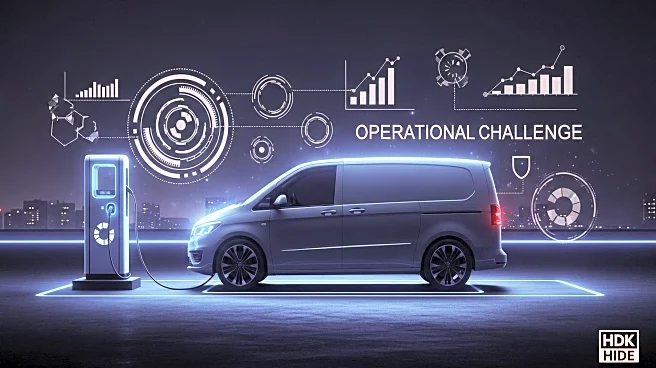What's Happening?
New research from the Arval Mobility Observatory Barometer indicates a decline in fleet operator confidence regarding the adoption of electric vans in the UK. Fleet managers now expect electric vans to constitute only 14% of their total fleet by 2028, down from previous years. The survey highlights persistent challenges such as range limitations, payload capacity, and inadequate charging infrastructure. Despite government efforts to push for zero-emission vehicles by 2035, the proportion of petrol and diesel vans is expected to rise, signaling a short-term reversion to traditional fuels.
Why It's Important?
The findings underscore the difficulties faced by fleet operators in transitioning to electric vehicles, which could impact the UK's ability to meet its environmental targets. The reliance on traditional fuels suggests potential setbacks in reducing carbon emissions and achieving sustainability goals. This trend may influence government policies and investments in charging infrastructure and vehicle technology. The commercial vehicle sector's slow adoption of electric vans could affect manufacturers and suppliers, prompting a reevaluation of strategies to address operational barriers.
What's Next?
The survey results may prompt policymakers to reassess strategies for promoting electric vehicle adoption, including increased investment in charging infrastructure and incentives for fleet operators. Industry stakeholders may explore technological advancements to overcome range and payload limitations. The government could face pressure to develop contingency plans to ensure progress towards zero-emission targets. Collaboration between manufacturers, fleet operators, and policymakers will be crucial in addressing the systemic challenges identified in the research.
Beyond the Headlines
The reluctance to adopt electric vans highlights broader issues in the transition to sustainable transportation, including economic and logistical barriers. The findings may influence public perception of electric vehicles and impact consumer demand. The survey reflects a need for comprehensive solutions that address the unique requirements of commercial fleets, potentially driving innovation in vehicle design and infrastructure development.











